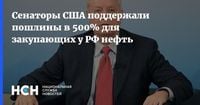In a significant move reflecting bipartisan support, 72 U.S. senators have rallied behind a new bill aimed at imposing stringent sanctions on Russia should it refuse to engage in peace negotiations regarding the ongoing conflict in Ukraine. The announcement was made by Republican Senator Lindsey Graham, who is one of the bill's authors, as reported by Bloomberg.
The proposed legislation has garnered more than the critical threshold of 60 votes needed for passage in the Senate, according to The Wall Street Journal. Among the prominent supporters are Senate Majority Leader John Thune, a Republican, and Senate Minority Leader Chuck Schumer, a Democrat, indicating a rare moment of unity across party lines.
Graham expressed optimism that by the end of the week, the number of co-sponsors could reach at least 67, a figure that would help in overcoming any potential veto from President Donald Trump. "The goal is to help the president," Graham stated, emphasizing the importance of the initiative in the current geopolitical climate.
Bloomberg noted that Graham's statements coincided with a recent agreement between the United States and Ukraine concerning natural resources, underscoring the urgency of the sanctions proposal. The bill outlines both primary and secondary sanctions against Russia, including a staggering 500% tariff on imports from countries that continue to buy Russian oil, petroleum products, natural gas, or uranium. This move is intended to pressure nations that maintain economic ties with Russia.
In addition to the tariffs, the legislation seeks to prohibit U.S. financial institutions from investing in entities associated with the Russian government and to prevent American citizens from purchasing Russian government bonds. Graham articulated the bill's intent, stating, "Vladimir Putin will make a huge mistake if he tries to outplay Trump. This bill must become an instrument in the arsenal of the U.S. president."
The backdrop to this legislative effort is a series of negotiations aimed at achieving a ceasefire between Russia and Ukraine, with Washington reportedly considering the possibility of easing sanctions if a peace agreement is reached. However, U.S. officials have also warned that new sanctions could be imposed if negotiations falter.
As the situation continues to evolve, Graham's initiative reflects a broader sentiment in the Senate that Russia's actions warrant a strong response. The proposed sanctions are seen not only as a punitive measure but also as a diplomatic tool that could influence Russia's decision-making process.
While the bill has received substantial support, it also faces challenges, particularly regarding its implications for U.S. relations with other countries that may be affected by the tariffs. Critics argue that such sweeping sanctions could lead to unintended consequences, straining relationships with allies who rely on Russian energy supplies.
In light of these complexities, the bill's supporters are keen to ensure that it is framed as a necessary step to uphold international law and support Ukraine in its fight for sovereignty. Graham and others believe that demonstrating a united front in Congress will send a strong message to both Russia and the international community.
As the Senate prepares to debate the bill, the stakes are high. The outcome could significantly impact U.S. foreign policy and its approach to handling aggression from Russia. Graham has expressed confidence in the bill's prospects, stating, "I have enough support in the House of Representatives to bring the sanctions bill to a vote there as well."
In summary, the bipartisan initiative led by Graham represents a critical juncture in U.S. legislative efforts to address the ongoing conflict in Ukraine and the broader implications of Russia's actions on the global stage. With negotiations ongoing and the potential for new sanctions looming, the coming days will be pivotal in determining the future of U.S.-Russia relations and the international response to the crisis.






